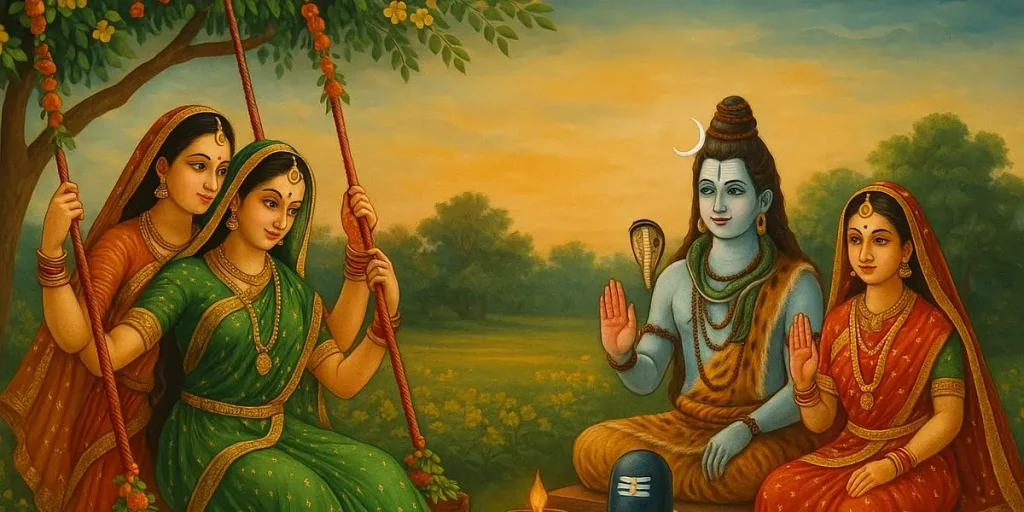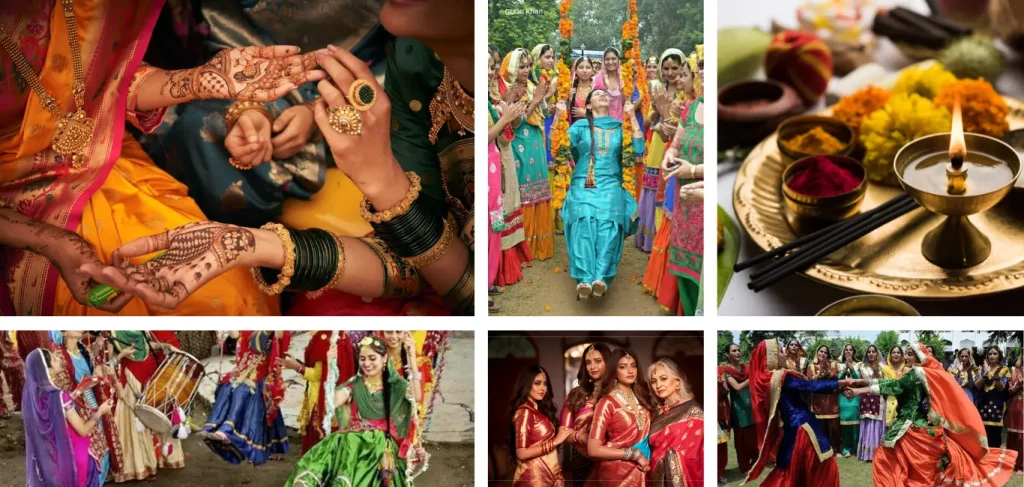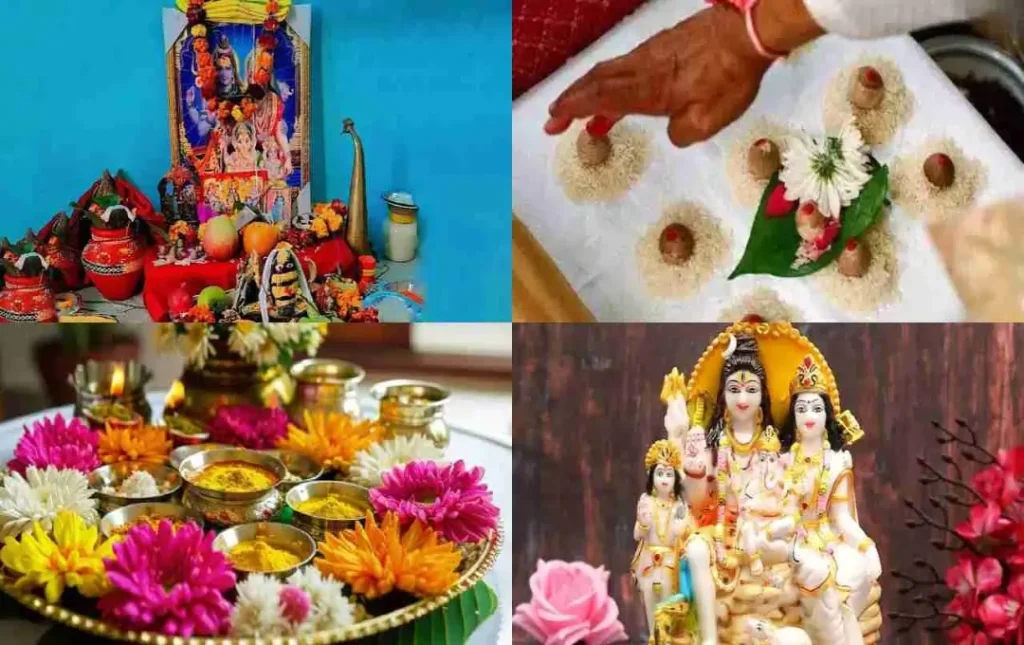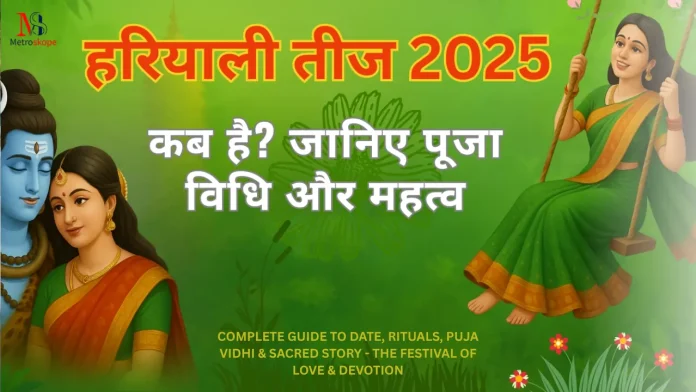Hariyali Teej 2025: There’s something magical about the monsoon season in India – the earth turns emerald green, the air smells of petrichor, and somewhere in the distance,
you can hear the melodious sound of women singing traditional Teej songs while swinging under the rain-kissed trees.
Hariyali Teej 2025 brings with it not just the promise of renewed love, but also the deeply emotional story of devotion that transcends lifetimes.
Imagine waiting for someone for 108 lifetimes. Imagine loving so deeply that you’re willing to undergo the harshest penance, the most challenging trials, just for one moment of union.
This isn’t just a fairy tale – this is the sacred story of Goddess Parvati and Lord Shiva that forms the heart of Hariyali Teej, and honestly, it makes even the most cynical heart believe in true love again.
Hariyali Teej 2025
Hariyali Teej 2025 falls on Sunday, July 27, 2025 during Shravan month. Married women observe nirjala fast for marital bliss, wearing green attire and applying mehndi.
The festival celebrates Lord Shiva-Parvati’s divine union after her 108 lifetimes of penance. Traditional celebrations include swings, ghevar sweets, and sindhara gifts from parents.
The Sacred Date & Divine Timing
Hariyali Teej 2025 will be celebrated on Sunday, July 27, 2025.
The festival falls on the Tritiya Tithi (third lunar day) of Shukla Paksha in the holy month of Shravan, making it one of the most auspicious times of the year.
Precise Timings That Matter
| Event | Date & Time |
|---|---|
| Tritiya Tithi Begins | Saturday, July 26, 2025 at 10:41 PM |
| Tritiya Tithi Ends | Sunday, July 27, 2025 at 10:41 PM |
| Main Celebration Day | Sunday, July 27, 2025 |
| Special Ravi Yoga | July 27, 4:23 PM to July 28, 5:40 AM |
| Best Puja Time | Early morning hours of July 27 |
The presence of Ravi Yoga during this Teej makes it even more special – it’s believed that prayers and rituals performed during this period bring extraordinary blessings.
The Heart-Wrenching Story Behind the Festival

A Love That Conquered Time Itself
The story of Hariyali Teej isn’t just mythology – it’s a testament to the power of unwavering devotion. Goddess Parvati undertook penance for 108 lifetimes to win Lord Shiva’s heart.
Can you imagine the depth of that love? The persistence? The faith that never wavered even across multiple rebirths?
When Parvati was born as the daughter of King Himavan, she knew her destiny. She had loved Shiva through countless lifetimes, and this time, she was determined to unite with him.
Her meditation was so intense, her devotion so pure, that even the gods were moved. Finally, on the day we now celebrate as Hariyali Teej, Lord Shiva accepted her as his consort.
“The festival signifies the union of Lord Shiva and Maa Parvati. It is believed that Maa Parvati undertook 108 lifetimes of penance to win Lord Shiva’s heart. On Hariyali Teej, that wish was fulfilled.”
The Complete Puja Vidhi: Step-by-Step Sacred Rituals
Pre-Dawn Preparations (Before Sunrise)
Wake up before sunrise and begin your day with a purifying bath. This isn’t just about physical cleanliness – it’s about preparing your soul for the divine connection you’re about to make.
Take a sacred vow (Sankalp) by holding flowers and rice in your hands while meditating on Lord Shiva and Goddess Parvati. Offer these to the divine couple and formally begin your fast.
Setting Up the Sacred Space
- Clean and purify the puja area with cow dung paste, then sprinkle Ganga water for sanctification
- Create clay idols of Lord Shiva, Goddess Parvati, and Lord Ganesha using pure mud or sand. If you can’t make idols, photographs or existing murtis work perfectly
- Place a red or yellow cloth on a wooden platform and establish the deities
The Sacred Ritual Sequence
| Step | Ritual | Significance |
|---|---|---|
| 1 | Invoke the deities with devotion | Calling divine presence into your home |
| 2 | Perform abhishek with Panchamrit and Ganga water | Purifying and honoring Lord Shiva |
| 3 | Offer Solah Shringar to Goddess Parvati | Complete adornment representing marital bliss |
| 4 | Present Bel leaves, Dhatura, and seasonal flowers | Shiva’s favorite offerings |
| 5 | Light ghee lamp and incense | Creating divine atmosphere |
| 6 | Offer bhog (prasad) | Sharing your devotion through food |
| 7 | Read Teej Vrat Katha | Connecting with the sacred story |
| 8 | Perform aarti | Final worship and gratitude |
Special Offerings for Divine Blessings
For Lord Shiva: Bel leaves, Shami leaves, Dhatura, Cannabis, Aak flowers, and Kaner flowers
For Goddess Parvati: Red Kaner flowers, Mandar flowers, and complete Solah Shringar items
For Lord Ganesha: Fresh Durva grass
The Art of Teej Preparation: How to Get Ready

The Sacred Sixteen Adornments (Solah Shringar)
Preparing for Teej isn’t just about looking beautiful – it’s about embodying the divine feminine energy. Married women traditionally perform Solah Shringar, the sixteen sacred adornments that represent complete feminine grace:
- Green saree or lehenga (symbolizing fertility and prosperity)
- Green bangles (representing marital bliss)
- Mehndi on hands and feet (traditional beauty and blessing)
- Sindoor (mark of married status)
- Traditional jewelry
- Kajal (eye protection and beauty)
- Fresh flowers in hair
“Wearing green sarees, green bangles, and performing solah shringar are considered auspicious, as green symbolises fertility, growth, and prosperity during the monsoon.”
The Nirjala Fast: A Test of Devotion
The Nirjala fast is one of the most challenging aspects of Hariyali Teej – no food, no water for the entire day. It might seem extreme, but there’s profound spiritual significance behind it.
This fast represents the same level of dedication that Goddess Parvati showed during her penance.
The Sacred Teej Katha: A Story That Touches Hearts
The Divine Love Story
Long ago, when the world was young and gods walked among mortals, there lived a princess who loved so deeply that it transcended death itself. Parvati, in her previous birth as Sati, had already proven her devotion to Shiva by sacrificing her life.
But love like theirs doesn’t end with death – it only grows stronger.
In her new birth as the daughter of the Mountain King Himavan, Parvati’s heart knew only one desire – to unite with her beloved Shiva.
While other princesses played with toys, she meditated. While they learned music and dance, she practiced yoga and penance.
Her father tried to arrange her marriage with Lord Vishnu, but Parvati’s heart belonged elsewhere.
With the help of her devoted friend (which is why one form of Teej is called “Hartalika” – from “Harat” meaning to take away and “Aalika” meaning female friend), she escaped to the forest to continue her meditation.
For years, she sat in meditation, eating only leaves, then only air, and finally surviving on nothing but her devotion.
Her tapasya was so intense that it created cosmic disturbances. Finally, Lord Shiva appeared before her, tested her devotion one final time, and then accepted her as his eternal consort.
The day of their divine union is celebrated as Hariyali Teej.
Traditional Bhog: Food That Feeds the Soul

Sacred Offerings
The bhog for Hariyali Teej is a feast fit for the gods:
- Ghevar: The crown jewel of Teej sweets – a honeycomb-like dessert topped with cream and dry fruits
- Kheer: Sweet rice pudding that symbolizes abundance
- Seasonal fruits: Representing nature’s bounty
- Halwa made from semolina: Traditional offering
- Jalebi: Sweet spirals of joy
- Balushahi and Shakkar Para: Traditional sweets
“Traditional Hariyali Teej food – Like every Indian festival, Teej too is popular for traditional items like ghevar, a honeycomb-like dessert topped with cream and dry fruits and kheer.”
Hariyali vs Hartalika Teej: Understanding the Difference
Many people get confused between these two beautiful festivals. Here’s the emotional truth behind both:
Key Differences That Matter
| Aspect | Hariyali Teej | Hartalika Teej |
|---|---|---|
| Date 2025 | July 27, 2025 | August 26, 2025 |
| Month | Shravan (Sawan) | Bhadrapada |
| Atmosphere | Joyful celebration with swings and songs | More austere, focused on intense devotion |
| Fast Type | Nirjala (can vary by region) | Strictly Nirjala |
| Significance | Celebrates the reunion of Shiva-Parvati | Honors Parvati’s penance and sacrifice |
| Rituals | Mehndi, swings, community celebrations | Clay idol worship, all-night vigils |
The Emotional Core
Hariyali Teej is like the wedding celebration – it’s the joy of union, the happiness of love fulfilled. The greenery around (hence “Hariyali” meaning green) represents new beginnings, fertility, and the lushness of love.
Hartalika Teej is like the engagement story – it focuses on the sacrifice, the waiting, the intense devotion that made the union possible.
The Modern Relevance: Why Teej Still Matters
In our fast-paced, digital world, you might wonder why an ancient festival still holds such emotional power.
The answer lies in what Teej truly represents – the celebration of commitment, devotion, and the belief that true love can overcome any obstacle.
For Married Women
It’s a day to celebrate the partnership, to honor the commitment, and to pray for continued happiness in marriage.
For Unmarried Women
It’s a day to believe in true love, to pray for a partner who will respect and cherish them, just as Shiva cherishes Parvati.
For Everyone
It’s a reminder that devotion – whether to a person, a cause, or a dream – has the power to move mountains and even change destiny.
The Sindhara Tradition: Gifts of Love
One of the most heartwarming traditions of Hariyali Teej is Sindhara – a basket of gifts that parents send to their married daughter.
This isn’t just about material presents; it’s about maintaining the emotional connection between a daughter and her parental home.
Traditional Sindhara includes:
- Homemade sweets and Ghevar
- Green bangles and jewelry
- Mehndi and beauty items
- New clothes
- Blessings and love
“Sindhara is a bucket of gift which is sent to the daughter and her in-laws by the parents of married girl. Sindhara contains homemade sweets, Ghewar, Henna, bangles etc.”
Embracing the Divine Feminine
As the sun sets on Hariyali Teej 2025, and women across India break their fasts while looking at the moon, there will be a collective feeling of fulfillment – not just from the physical act of eating after a day of fasting, but from connecting with something eternal and beautiful.
Hariyali Teej isn’t just a festival; it’s a celebration of the divine feminine, the power of devotion, and the belief that love – true, patient, unwavering love – can indeed conquer all.
Whether you’re married or single, young or old, this festival reminds us all that we are capable of the kind of love that transcends lifetimes.
So this July 27, 2025, as you prepare for Hariyali Teej, remember – you’re not just observing a ritual.
You’re participating in a love story that began before time itself, and that continues to inspire millions of hearts even today.
The swing may creak in the monsoon breeze, the mehndi may fade from your hands, but the blessings of this sacred day – the promise of enduring love, unwavering devotion, and divine grace – those will remain with you forever.

